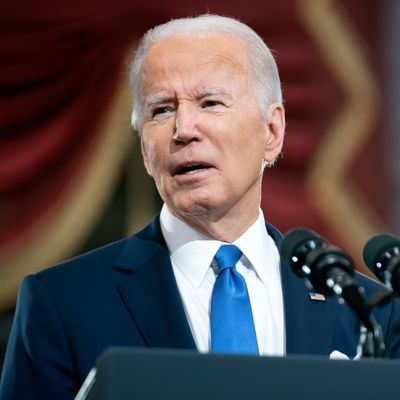
As part of the Democrats’ big voting-rights push, which is expected to culminate in Senate votes on the Freedom to Vote Act, President Biden (accompanied by Vice-President Kamala Harris, in an unusual road-show twofer) is traveling to Atlanta today for a big speech on the subject.
Given the extremely limited odds of legislative success on voting rights in the Senate, so long as Republicans filibuster it and two Democrats oppose filibuster reform, it’s appropriate to ask what Biden hopes to accomplish with this address. There are, it’s apparent, three different audiences he’s trying to reach.
Voting-rights advocates and the voters they represent
Biden’s most urgent task is to convince his party’s progressive base — most particularly voting-rights advocates and nonwhite voters — that he is “all in” on the subject, despite fears that he has sacrificed voting rights to other priorities, like the Build Back Better package. He has not yet made it publicly clear, for example, that he unambiguously favors the serious filibuster reforms necessary to overcome Republican obstruction in the Senate on legislation (like voting rights) that cannot be enacted as part of a budget-reconciliation bill like BBB. Biden has, in fact, been a little dodgy or even reactionary on this subject in the past.
It adds to the emotional impact of the Biden-Harris visit to Atlanta that it will occur just as Atlanta is preparing for the Martin Luther King Jr. holiday on January 17. The president and vice-president will reportedly lay a wreath at Dr. King’s burial site and pay a visit to the Ebenezer Baptist Church, where King’s most recent successor is Georgia’s new Democratic senator, Raphael Warnock.
The risk, of course, of any presidential statement making voting rights and filibuster reform a key test of Biden’s presidency, and for the governing trifecta Democrats temporarily control, is that he may raise expectations he is incapable of meeting, which could be deadly going into what is likely to be an enthusiasm-driven midterm election where his party is already in serious trouble.
Swing voters in Georgia
If Biden were speaking almost anywhere else, he could treat the people actually in front of him as props as he addresses other national audiences. But the Peach State is and will likely remain a key battleground state. Senator Raphael Warnock is running for a full term in November, probably against Georgia-born football legend Herschel Walker, a close friend of Donald Trump. And national voting-rights icon Stacey Abrams is running again for governor in a contest that will receive enormous attention, in part because of Trump’s efforts to purge incumbent Republican Brian Kemp via a primary challenge from former senator David Perdue. Biden reportedly chose to make the speech in Georgia in order to dramatize the new voter-suppressing election law Republicans enacted earlier this year; the White House staff has referred to Georgia as “the belly of the beast.”
But the law in question has united Georgia Republicans as has nothing else; even Trump’s No. 1 purge target, Secretary of State Brad Raffensperger, has enthusiastically endorsed it. So Biden needs to be sure-footed on this issue lest he sacrifice Democratic prospects in Georgia to some national intra-party maneuver.
The timing is a little tricky, too. The night before Biden’s speech in Atlanta, the University of Georgia Bulldogs played the Alabama Crimson Tide for the college-football national championship – and won. This is a very big deal in this football-mad state, and could easily reduce the amount of attention a presidential event might normally attract.
As it happens, I was a speechwriter for the Georgia governor (George Busbee) who was in office last time UGA won a national championship in football. He had to deliver a State of the State Address about a week after the big victory, and we planned a major bid for national attention in remarks on Reagan’s New Federalism initiative. But Busbee began by gravely talking about “the question all Georgians are asking each other today,” and delivered the punch line: “How ’bout them dawgs?” Biden should consider something similar.
Joe Manchin and Kyrsten Sinema
What would fully vindicate the Democratic voting-rights “push” generally and Biden’s speech specifically? That’s simple: a change of position by the two Democratic senators currently blocking filibuster reform, the senior senators from Arizona and West Virginia. The odds of that happening are by general assent very low; both Manchin and Sinema have repeatedly and recently reiterated their opposition to any significant changes in the threshold for ending a filibuster (now an impossible 60 votes for anything Republicans oppose). Manchin in particular has no real political incentive to bend to the will of a president who won less than 30 percent of the vote in his state in 2020. And with BBB still subject to negotiations between Biden and Manchin, how the former talks about the latter in Atlanta could have all sort of collateral effects, some of them bad.
So the president must thread multiple needles in Atlanta, all without sacrificing the passionate commitment he needs to show he shares with nearly all Democrats on this fraught subject.






























